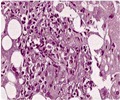Imperial College introduces a groundbreaking blood test, using gene expression to decode fevers in children and offer swift disease diagnosis.
- Imperial College's Personalized Molecular Signature Diagnosis (PMSD) test uses gene expression to swiftly diagnose the cause of fevers in children
- GlobalData's Selena Yu sees potential in gene expression pattern recognition to streamline multiparameter testing
- The new diagnostic method can identify 18 disorders in under 60 minutes, offering an advantage in cases with overlapping symptoms
Diagnosis and Management of Febrile Illness using RNA Personalised Molecular Signature Diagnosis
Go to source). According to GlobalData, a renowned data and analytics organization, the strategy involving gene expression profiling will improve diagnosis workflows because many diseases have similar symptoms.
Optimizing Diagnostics with Gene Expression Pattern Recognition in Multiparameter Testing
Selena Yu, Medical Analyst, at GlobalData, comments, “With multiparameter testing becoming more common in hospitals globally, gene expression pattern recognition could be applied before specific testing. Current multiparameter tests are grouped by disease type, like respiratory illness or sexually transmitted infections panels. However, these panels require healthcare professionals to have direction in their diagnosis.”Imperial College's Innovative 60-Minute Diagnostic with Gene Pattern Recognition
In less than 60 minutes, the Imperial College London test differentiates and diagnoses 18 inflammatory or infectious disorders such as respiratory syncytial virus and tuberculosis. Furthermore, the test uses machine learning to determine which gene expression patterns are associated with specific diseases and infections. Although the test is not yet clinically available, there is significant promise in gene expression pattern recognition and mapping for disease diagnosis across a wide range of age groups and disorders.PMSD Tests Offer Quick Diagnosis in Overlapping Symptoms
Yu concludes, “When symptoms are blurred across different types of illnesses, tests that use PMSD may have an upper hand. For example, fevers are one of the most common symptoms across many diseases and infections, thus having a test that goes beyond viral, fungal, or bacterial infection can buy valuable time in treating the patient quickly and effectively.”Reference:
- Diagnosis and Management of Febrile Illness using RNA Personalised Molecular Signature Diagnosis - (https://cordis.europa.eu/project/id/848196)
















